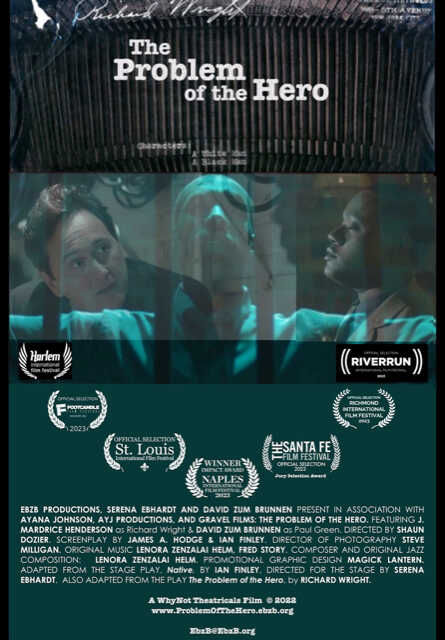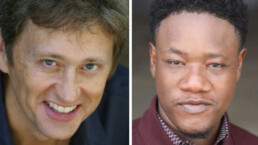Most people may know about the prolific writer Richard Wright and his classic novel Native Son, a seminal work in American history. Lesser known, however, is that he also developed the story into a stage play, working with groundbreaking author Paul Green to do so. The process would not be an easy one, as the creative collaborators were forced to acknowledge and discuss the racism that very much divided the segregated South at the time. The story behind bringing this joint effort to the stage is dramatized in the new feature film The Problem of the Hero.
Portraying the two American icons are David Zum Brunnen and J. Mardrice Henderson, playing Green and Wright respectively. In our exclusive interview, David and J. Mardrice discuss their processes of bringing such historic characters to life and the complicated state of debate and dialogue today, as well as their experiences and challenges in indie filmmaking, of which their passions run deeply.
The Problem of the Hero dramatizes the story of groundbreaking author Richard Wright and Pulitzer Prize-winning playwright Paul Green as they work together to adapt Wright’s acclaimed novel Native Son into a Broadway play. What were each of your processes like for researching and ultimately creating these historical figures that you portray in the film?
David Zum Brunnen: Most everyone in North Carolina of a certain generation (mine or older) grew up aware of who Paul Green was (is), as he was quite intentional in the use of his craft, his art, toward his social justice activism. I was raised in a household where reading and a love of history were prevalent. As I grew up, and in my undergraduate studies, I couldn’t avoid reading Paul Green, and my fascination with his work and his life–the living of his life and his activism (in NC and the southeast US)–has never relented.
I’ve seen and heard recorded interviews with him. I’ve read his plays, his works, and works about him. In some ways, I feel as if I’ve lived closely with him for the last twelve years since this project was initially conceived. He considered himself a “folk philosopher.” That stirred my curiosity even deeper.
J. Mardrice Henderson: Coincidentally enough, I was not at all familiar with Richard Wright before becoming a part of this creative process. I’ve been an admirer of the Harlem Renaissance era with an affinity for writers such as Langston Hughes, James Baldwin, and Zora Neale Hurston. I even auditioned for Native (the play written by Ian Finely that precursors The Problem of the Hero) with a Langston Hughes poem. After reading that script, I knew I had to learn more about Mr. Wright both personally and creatively.
I started with Native Son, which is as brutal as described both onstage and on film, especially for his time. I read books about Mr. Wright from some of his contemporaries. I also found some visual footage to try and infuse his mannerisms and characteristics into my performance. Mr. Wright was certainly an intellectual and a pioneer of his time and his craft.
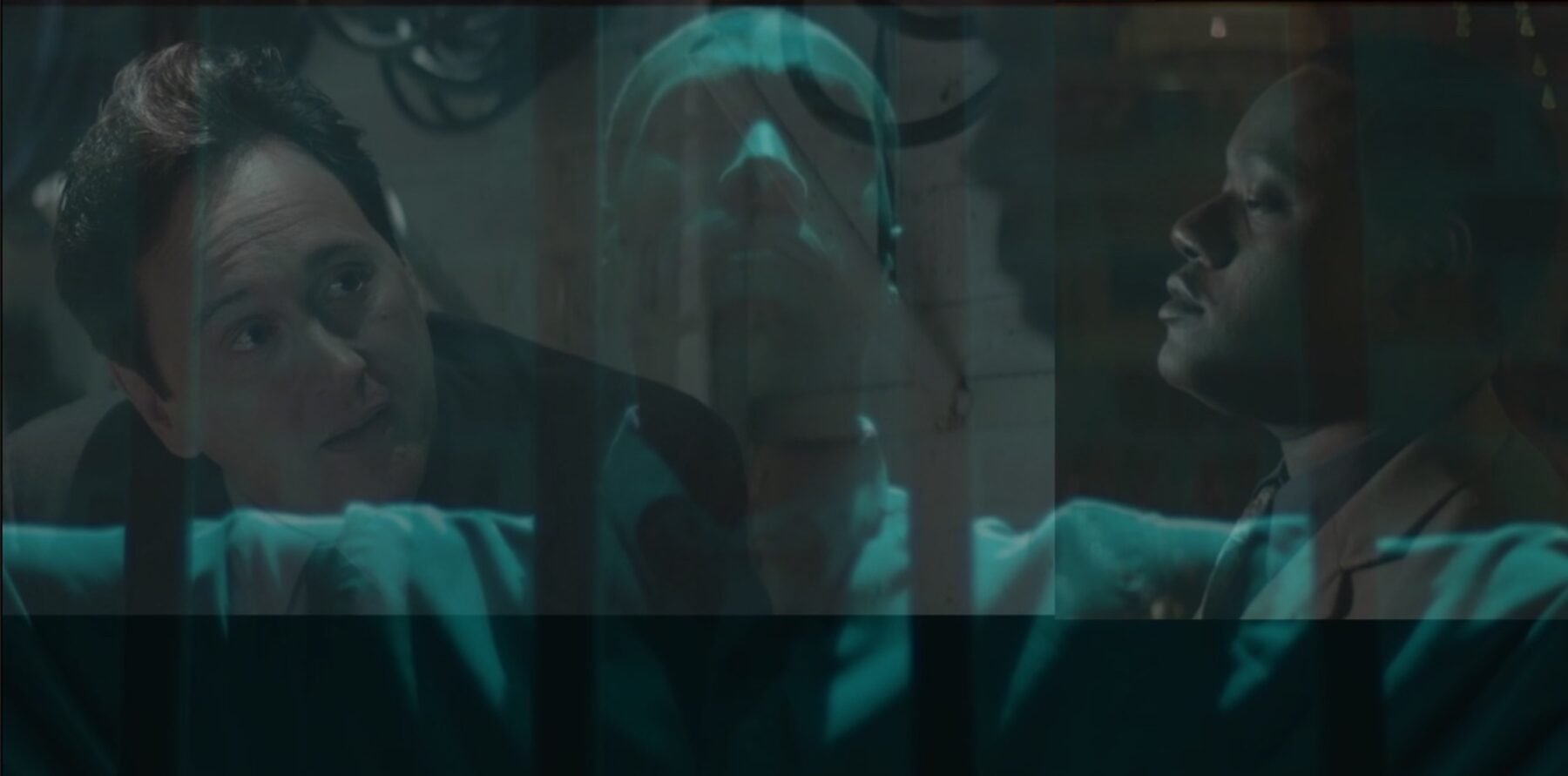
Audiences have not largely seen characterizations of each of these historical figures before onscreen. What did you find was important to materialize in your characters?
DZB: I hoped to be as authentic as possible with the gift of the script provided by James A. Hodge & Ian Finley. Yes, I need to know who Paul Green was in the living of his life, what his behaviors were, his phrasing, and his “voice,” but it was also important for me not to merely imitate him. Authenticity is key. We’ve been asked if these two men spoke as they do in this film, and I can confirm that they did indeed speak & write in the fashion we attempt to convey.
JMH: There is always some trepidation when portraying individuals who existed, especially when said person is beloved by many. There’s a pressure of getting it right, doing it well, and not tarnishing this person’s legacy. That is why research is important as well as finding where the art and the artist merge.
I was able to find similar characteristics and personality traits that Mr. Wright and I share. Both he and I have a thirst for knowledge and aren’t afraid to go against the grain regarding our passions. This, I believe, lends itself to the honesty and gravitas of a performance.
The story, written by James A. Hodge and Ian Finley (adapted from the stage play Native by Ian Finley), largely rests on your characters shared dialogue, which explores topics about race, social justice, politics, and personal & creative agency quite deeply. What was it like for each of you to read the script on your own as well as together for the first time?
DZB: Well, I was engrossed by Ian’s stage script and James & Ian’s screenplay from the first read. But allow me to tell the story of when we held auditions for the stage play, Native, by Ian…
Serena Ebhardt (the director of the stage play) and I agreed that I would portray Paul. We had already workshopped the play at Deep Dish Theatre in Chapel Hill, NC, and were now looking to tour it. In walked Josh, and we both knew we had our Richard Wright. It was immediate as we sat there in the studio theatre. And then we just sat there, still, and listened to Josh perform a Langston Hughes poem.
JMH: Upon receiving Ian’s script, after being cast, I was simultaneously anxious and excited. It’s a two-character piece with heavy dialogue, both in weight and length. And though I am removed from a lot of what Mr. Wright endured in his upbringing, there was something ancestral about his story and his experiences.
My father had told me of some of his experiences growing up in the 1960s that mirrored Mr. Wright’s experiences long before him. What I truly loved about Ian’s script is that it relays Mr. Wright’s experience without the “angry black man” trope, but a man who has been formed by his circumstances that subsequently impassioned his creative momentum. Once rehearsals started with David and Serena, all the pieces came together so beautifully. It was an instant family.
How did you both work on your scenes? Were there any significant moments of discovery during this making, either in pre-production, rehearsal, or while shooting?
DZB: We’d already performed the stage play while touring some East Coast U.S. venues. But the screenplay is vastly different in some respects: the rhythms, the phrasing, the setting. While we had the screenplay in hand before rehearsals and before principal photography began, the script was changing daily. So, we had new lines each morning; sometimes even as we were filming the scene. The moments of discovery never ceased actually. Everything was new, each time. The screenplay was like putting on a different set of clothes from the stage play.
JMH: I had become comfortable with Ian’s script after having toured it many times. However, the screenplay was different in a lot of ways. It took some time to get used to the new dialogue and beats. There were often rewrites at the start of each day of filming which kept me on my toes. Many times David and I would go off in our separate corners to grasp the new rhythms and then come back together to combine our separate work; almost like a boxing match, but without the blood.
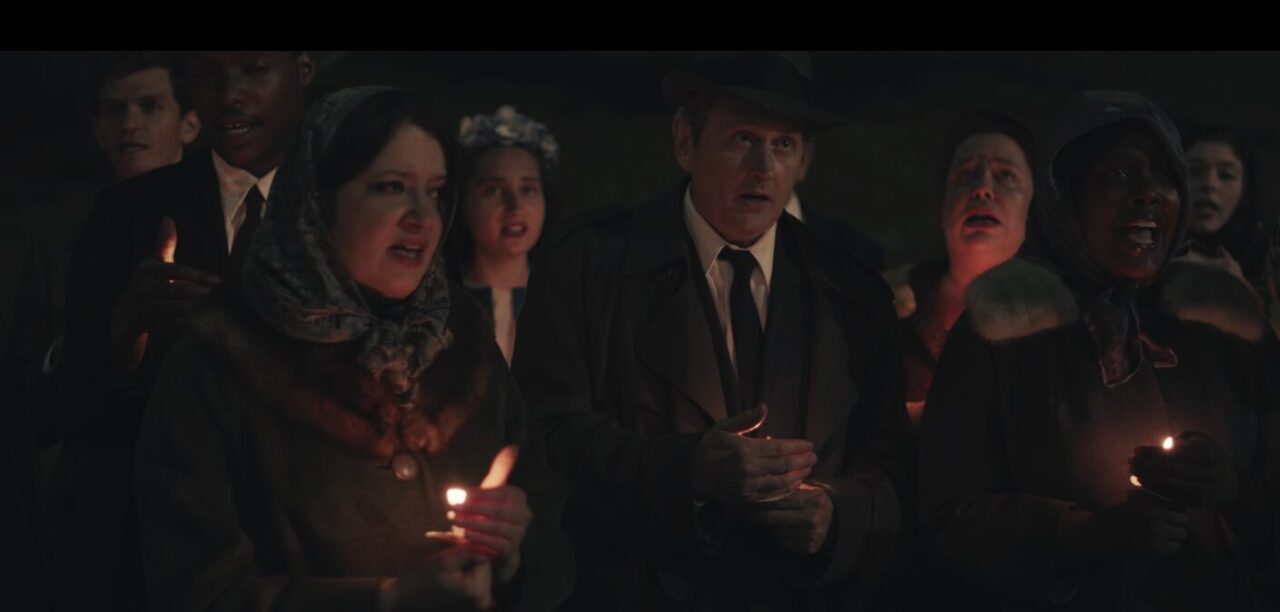
The film was directed by Shaun Dozier. What were the larger themes and ideas that he wanted to ensure came through in the film, through your performances? Was there any particularly insightful guidance or direction you remember him giving to you that you still remember?
DZB: Credit it to Shaun (and our cinematographer, Steve Milligan, and producer, Ayana Johnson) for establishing a strong sense of ensemble and adventure on the set each day. That element was essential for both cast & crew and I believe it shows in this film–where the whole ends up greater than the sum of its parts.
Shaun’s influence is all over this film–particularly in his guiding us through the emotional journey of each character. He was mindful (when we couldn’t be) of the emotional build for each scene and what intention we brought to each moment–particularly as we were shooting completely out of linear sequence, of course. I’ll admit that for me, there were a few moments of struggle with his very fine strokes of the director’s paintbrush and his specific adjustments for each take, but they were worth it.
JMH: I applaud Shaun for his creative vision and for knowing exactly what he wanted to do with this piece. There were times when I wasn’t quite certain how the puzzle was going to come together, but Shaun made us all comfortable and guided us well. Each time I see the film, I am in awe of the transitions and cinematic choices Shaun made.
I also have to give accolades to our DP, Steve Milligan, and our producer, Ayanna Johnson for both their professionalism and candor. It was certainly a safe, wonderful, inspiring atmosphere which–with this being my first feature film–I will cherish forever.
At its center, this story is about a difference of opinion between two people. It turns into a contentious dialogue but makes the audience think deeply about each of their perspectives and histories. How do you feel the story speaks to today’s culture or disagreement and how we relate to others of different ideologies?
DZB: I find this to be a quintessentially American story. Particularly with the tenor of the times in which we find ourselves. We live in a precarious time with a great many questions of how we live and work together unresolved. We are struggling to come to terms with someone else’s perspective that challenges us to think differently, and that perhaps hints to us that there’s more for us to learn from one another. We are struggling with embracing empathy.
That said, this is a brief moment in time in the extraordinarily full and creative lives of two brilliant men from the 20th century. And as difficult as it is to see how this story unfolds, it all happens in a fashion without the need to inflict violence on one another, and without an artificially imposed limit to the number of words or characters with which one can communicate. Yeah, I’m pointing to social media when I say that, and would it be so that we could all take the time to listen and perceive as fully as these two men tried to do in their own lives.
JMH: One of the things I love most about this story is that, at its center, it’s a story of friendship. These are two individuals who both admired and cared about each other. Their penchant for storytelling on culture, socioeconomic structures, and injustices is what made them contemporaries. With that as the foundation, the conversation that these two men have is much more palatable than having two men of different races arguing over such issues.
These issues are just as prevalent today as they were in that hotel room in the 1940s, however, many come to the table only wanting to be heard and not listen. We live in a nation where the lines of separation are so evidently clear. There’s no cause for compassion, no enamor for empathy. We move about the world in silos where our interests are mainly self-gratifying and egocentric. I truly feel that The Problem of the Hero presents a version of ourselves that is willing to listen, to understand, to amicably agree to disagree, and to be okay with that.
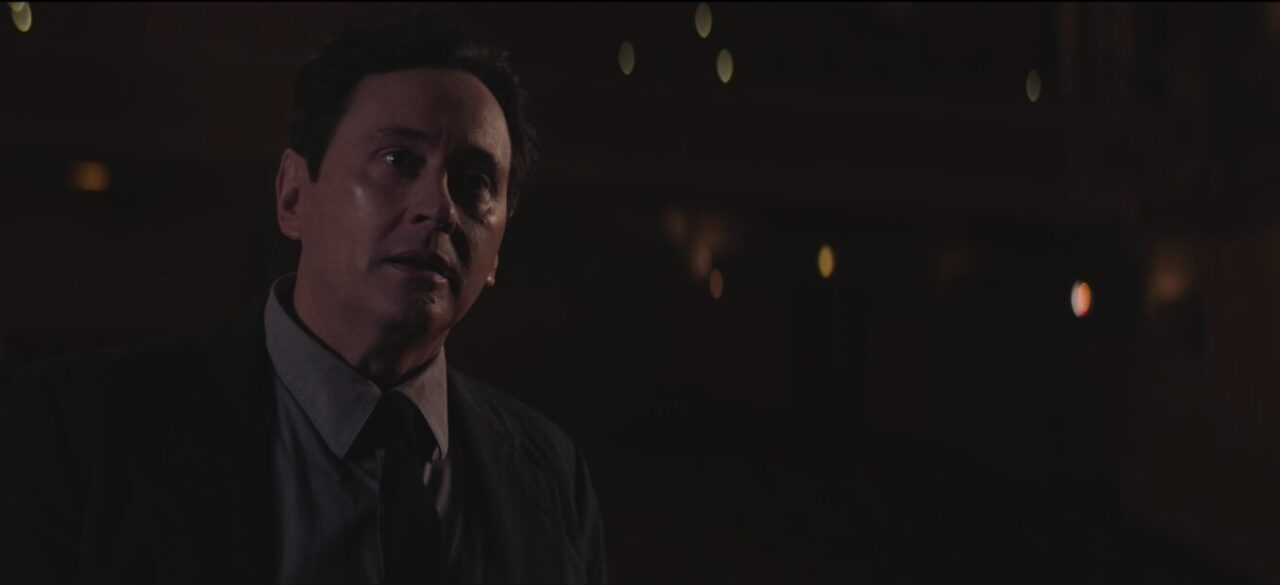
What are you most proud of about this film and what do you hope audiences take away from it?
DZB: The audience response has been most telling. The post-screening discussions that have occurred at every film festival thus far. They mirror each other. And as we’ve said at each screening, we’re still processing this film and its impact ourselves. And they’re the same conversations that occurred pre-production, on set every day amongst cast & crew during filming, during post, and on and on…
Ian and James’ writing has struck a chord for folks–particularly in light of the feedback we’re getting. Their response has mirrored our answers above–that this is a story that speaks deeply to the times in which we live–locally, nationally, and globally. With this film, we’ve asked people to embrace discomfort. It’s clear that for many this film and that discomfort still lingers with them.
JMH: I am proud that I can present one of the founding fathers of Black literature to his adoring fans and hopefully create new ones as well. I have been incredibly blessed to be on this journey with the group of individuals telling this story. I hope that the audience listens to what is being said between these two literary giants. I hope they digest not just the arguments but the experiences that support the arguments.
There have been many times where audiences have agreed with one author and disagreed with the other at the start. However, as the film progresses, their allegiances sway in a different direction. This is a film that has to be seen more than twice to really grasp all that it encompasses and ultimately leads the audience to question their own bias and prejudices.
Let’s learn more about you both: where are you both from and how did you get into acting?
DZB: I’m from a small town in North Carolina, called Salisbury. An idyllic place to grow up, because my parents made it so for my sister and me. But a place where life’s lessons are also plentiful. I’m a bit slow sometimes so I’m still learning some of those lessons. My kindergarten teacher, Mrs. Nell Troxler, cast me as a shepherd in the annual Christmas play. I sang a song, and then was instructed to rest on the stage floor “in the stable near the manger.” I took the note. I fell asleep, and I’ve been at home on the stage (or the set) ever since.
JMH: I, too, come from a small town–Ridgeway, North Carolina. It’s one of those places where you drive through, look back, and ask “Did you feel that?”. However, I never let my rural upbringing deter me from my BIG dreams. I fell in love with acting and writing early on. I remember playing a frog in a Disney-inspired production in the 1st grade. From there I began creating characters and stories on my grandmother’s front steps.
I followed that passion to the University of North Carolina at Greensboro where I received a Bachelor of Arts degree in Acting. From there, I began doing community theatre, student films, short films, and web series. I’ve been featured in the International Black Film Festival for the past two cycles. I’ve also had some of my original work featured on online platforms as well as onstage workshops.
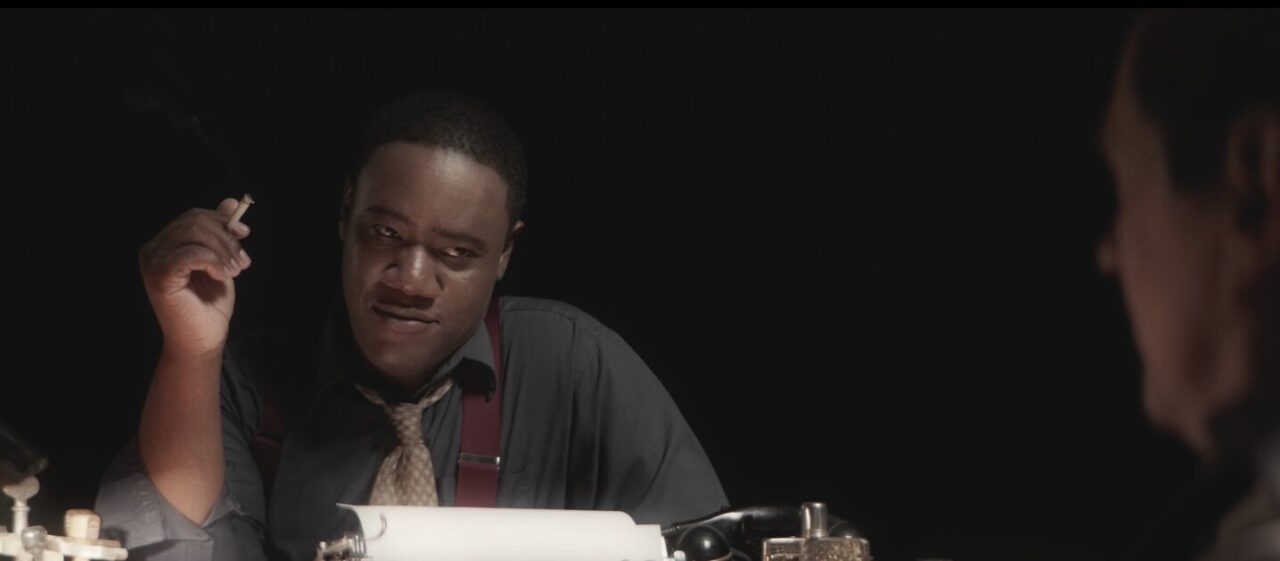
Who are your acting heroes, and what are your favorite performances of all time?
DZB: Besides J. Mardrice Henderson you mean? (big smile)
I always have a difficult time with this kind of question, because I feel pressured to remember all the wonderful performances I’ve ever experienced, in film & theatre. And there are a LOT. I also tend to lean to mention those I’m working with at a given moment, as I always find myself learning from those I’m playing opposite.
There are numerous actors here in North Carolina and the Triangle region here in NC from whom I’m always learning. One of ‘em is in the film: Derrick Ivey. Derrick can do anything; any role. I’ve said it often; he’s a remarkably gifted artist in many respects, not only as an actor but as a director, designer (a farmer, too!), you name it.
JMH: Oh, there are an abundant amount of actors/performances I admire. Denzel Washington in Glory, Morgan Freeman in Lean on Me, Viola Davis in Doubt, and Whoopi Goldberg in The Color Purple, just to name a few.
Gosh, from this list, seems I need to watch some more comedies. I also really enjoy working opposite great actors who are in the moment with me and can elevate a scene beyond what’s in the script. I truly enjoy working with David in every iteration of this script. Our bond has both big/little brother elements as well as mentor/mentee. I believe that is why so many of our performances have been met with such great accolades. Our personal and professional relationship aids my performance with aplomb.
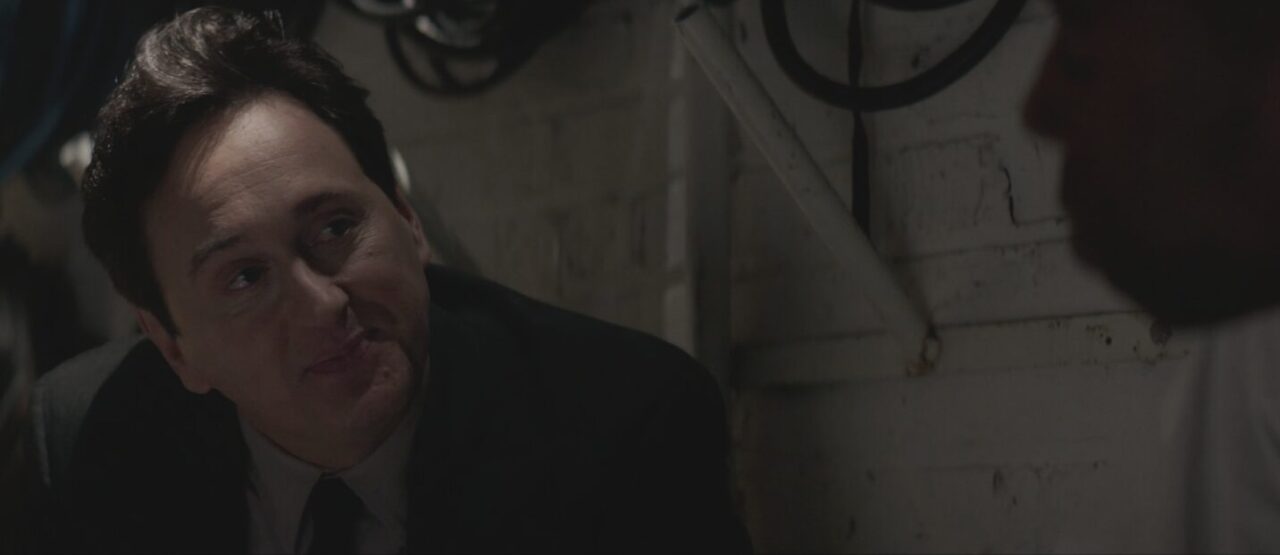
We would love to hear more about your experience working in indie filmmaking. What has been your experience working outside of the studio system, both positive and negative? Do you have any wisdom or lessons learned along the way that you can share with up-and-coming artists?
DZB: As an ensemble, the core creative team had the opportunity to make the film that we wanted to make. At the same time, I can’t count the number of times we’ve been dismissed; the shrugs, the “so what’s?” that we experienced in getting this film completed. I think that’s a pretty universal experience for many filmmakers. And it’s happened with practically every project our company has ever taken on in its twenty-five-plus years now.
The audiences that have seen the film thus far and the critical response hint to us that our diligence paid off. In other words. I say to our fellow storytellers… stick to it, keep at it. And know that your work is important; it’s essential. Never forget that.
JMH: This is my first foray into filmmaking of this caliber. I have been a part of filmmaking on a smaller scale, mostly as a talent. Even at this level, I have learned that tenacity is a tool to keep in your metaphorical bag. There are thousands, if not millions, with similar dreams who are more than willing to take your place. However, they can’t bring what you bring to the table. There’s an innate ability in each of us to be authentic in our quest. And that authenticity can’t be forced, only celebrated.
There are two adages I hold dear: “What’s yours is yours” and “Be yourself, everybody else is already taken.”
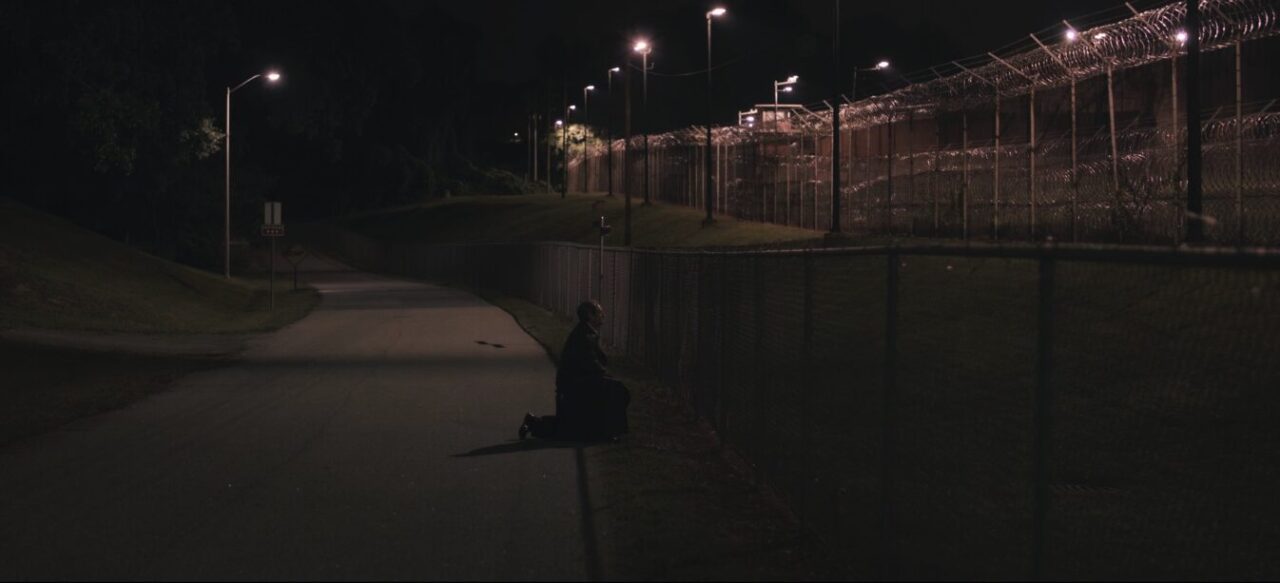
What is it about acting that keeps you going?
DZB: Curiosity. Fear. Opportunities to learn and put myself in the shoes of others. Fear is something I’ve come to embrace over time in my life. It’s a great motivator for me, and there’s always fear that comes for me while leaping into a place where I’m reminded of how little I know.
I was raised in an environment where vulnerability is strength – and I still find that to be true. That’s what acting often is for me. I think any creative action is that for me…. embracing the fear and the fun of the unknown, and letting it be your friend.
JMH: Acting is cathartic. It has truly been my therapy in some instances. I am very much an introvert and a staunch protector of my feelings and emotions in real life. However, when onstage or on screen, I can throw aside those idiosyncrasies and allow myself the joy of being open, being honest, and being vulnerable.
I am also a self-proclaimed “forever student” and acting is the forever study of the human condition. It has allowed me to learn more about myself as I learn more about others. If fame comes, that’s a bonus, but it’s the development of the craft that brings me the most joy.
Follow David Zum Brunnen through his production company on Facebook, Instagram, Twitter, LinkedIn, Vimeo, and their site.
Follow J. Mardrice Henderson on his Linktree, Facebook, Instagram, Twitter, and his site.
Follow ‘The Problem of the Hero’ on their site.
